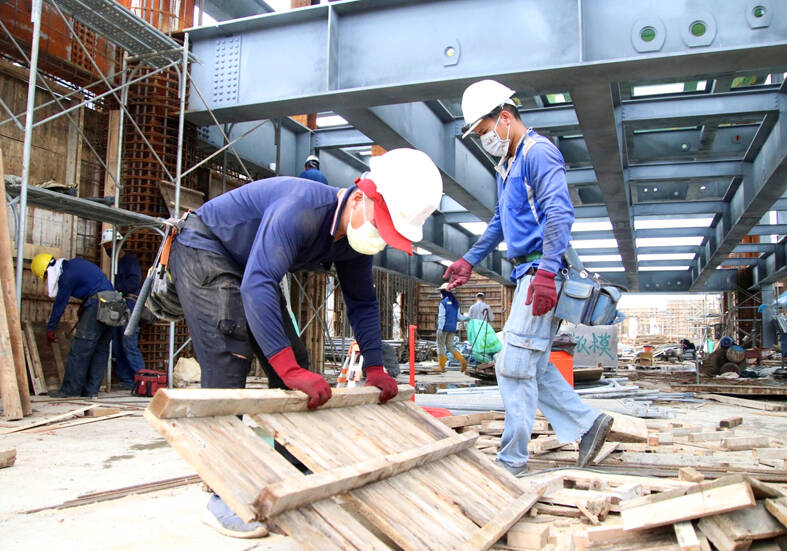Taiwan’s manufacturing output last quarter shrank 9.44 percent from a year earlier to NT$4.54 trillion (US$142.52 billion) due to tepid end-market demand for tech and non-tech products and lingering inventory adjustments, the Ministry of Economic Affairs said in a report released yesterday.
Output was down for a fourth consecutive quarter, dragged also by firms’ lack of interest in capital spending in the face of a business slowdown, the report said.
Industrial production fell by a steeper 11.43 percent to 87.69, marking the fifth straight quarter of decline, as all major sectors took a hit from global inflation and restrictive monetary policy, it said.

Photo: CNA
Electronic component manufacturers reported an industrial output of NT$1.38 trillion, declining 11.95 percent year-on-year, as demand for chips softened and clients digested inventories, limiting business for local suppliers of chips, printed circuit boards and Ajinomoto build-up film, or ABF, substrates, it said.
Flat panels bucked the downtrend by posting a 28.05 percent gain to NT$146.8 billion, thanks to restocking demand for large-screen TVs, it said.
Industrial production for computers and optical devices picked up 17.05 percent to a new high of NT$369.5 billion, driven by strong demand for data centers, cloud solutions and artificial intelligence (AI) applications, it said, adding that servers were a main beneficiary.
Suppliers of non-tech products fared weaker, as industrial output at firms making chemical materials and fertilizers slumped 16.64 percent, base metals fell 14.75 percent and machinery equipment contracted 14.51 percent, it said.
As global trade slowed, companies turned conservative on purchases of machinery equipment and input materials, it said.
Chips and parts used in vehicles held steady, with industrial output edging up 1.97 percent to NT$127.9 billion, as major players stimulated sales through active promotions and new model launches, it said.
Taiwanese manufacturers might come out of the woods with the release of new-generation technology products and peak sales season in China and the West, the ministry said.
Several tech firms earlier gave a positive business guidance for this quarter and beyond ahead of China’s Singles’ Day shopping festival this month and the upcoming holiday season in the West.
Booming demand from high-performance computing, AI and electric vehicles would continue to benefit local suppliers, the ministry said.
However, companies need to need to remain alert amid rising geopolitical tensions, technology competition between the US and China and the unfavorable impact of previous rate hikes, it said.

When an apartment comes up for rent in Germany’s big cities, hundreds of prospective tenants often queue down the street to view it, but the acute shortage of affordable housing is getting scant attention ahead of today’s snap general election. “Housing is one of the main problems for people, but nobody talks about it, nobody takes it seriously,” said Andreas Ibel, president of Build Europe, an association representing housing developers. Migration and the sluggish economy top the list of voters’ concerns, but analysts say housing policy fails to break through as returns on investment take time to register, making the

‘SILVER LINING’: Although the news caused TSMC to fall on the local market, an analyst said that as tariffs are not set to go into effect until April, there is still time for negotiations US President Donald Trump on Tuesday said that he would likely impose tariffs on semiconductor, automobile and pharmaceutical imports of about 25 percent, with an announcement coming as soon as April 2 in a move that would represent a dramatic widening of the US leader’s trade war. “I probably will tell you that on April 2, but it’ll be in the neighborhood of 25 percent,” Trump told reporters at his Mar-a-Lago club when asked about his plan for auto tariffs. Asked about similar levies on pharmaceutical drugs and semiconductors, the president said that “it’ll be 25 percent and higher, and it’ll

CHIP BOOM: Revenue for the semiconductor industry is set to reach US$1 trillion by 2032, opening up opportunities for the chip pacakging and testing company, it said ASE Technology Holding Co (日月光投控), the world’s largest provider of outsourced semiconductor assembly and test (OSAT) services, yesterday launched a new advanced manufacturing facility in Penang, Malaysia, aiming to meet growing demand for emerging technologies such as generative artificial intelligence (AI) applications. The US$300 million facility is a critical step in expanding ASE’s global footprint, offering an alternative for customers from the US, Europe, Japan, South Korea and China to assemble and test chips outside of Taiwan amid efforts to diversify supply chains. The plant, the company’s fifth in Malaysia, is part of a strategic expansion plan that would more than triple

Taiwanese artificial intelligence (AI) server makers are expected to make major investments in Texas in May after US President Donald Trump’s first 100 days in office and amid his rising tariff threats, Taiwan Electrical and Electronic Manufacturers’ Association (TEEMA, 台灣電子電機公會) chairman Richard Lee (李詩欽) said yesterday. The association led a delegation of seven AI server manufacturers to Washington, as well as the US states of California, Texas and New Mexico, to discuss land and tax issues, as Taiwanese firms speed up their production plans in the US with many of them seeing Texas as their top option for investment, Lee said. The